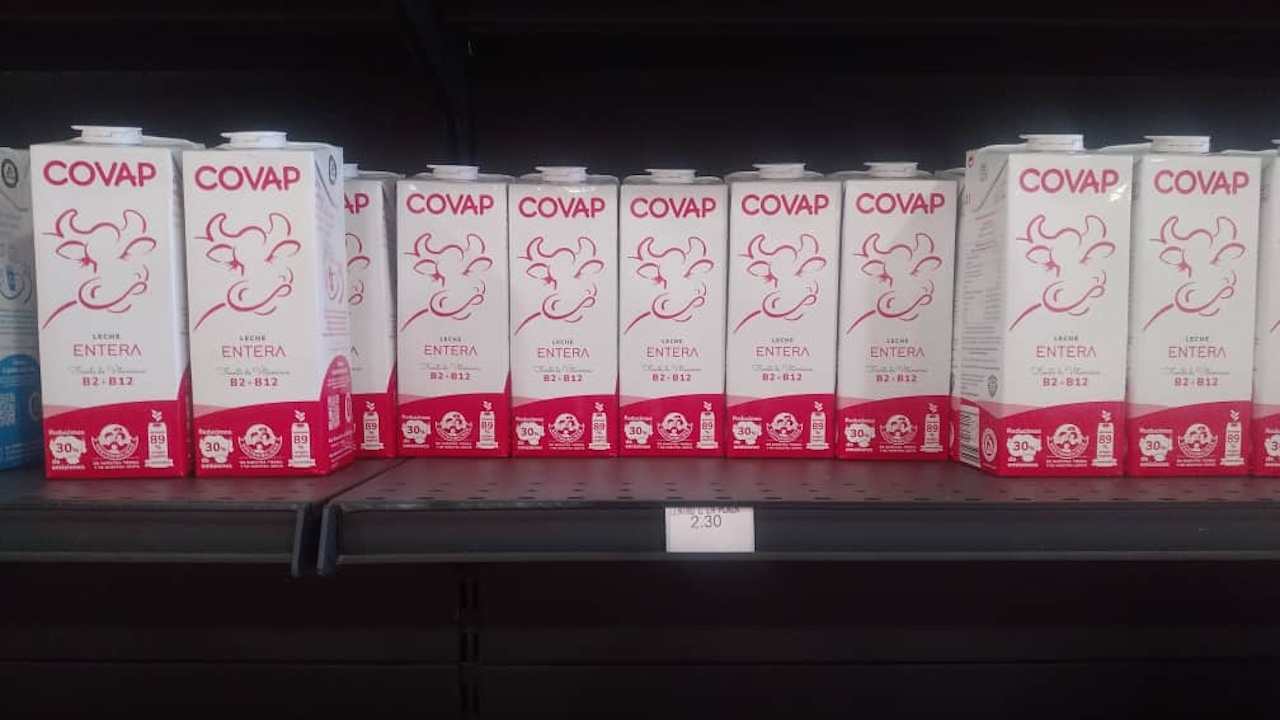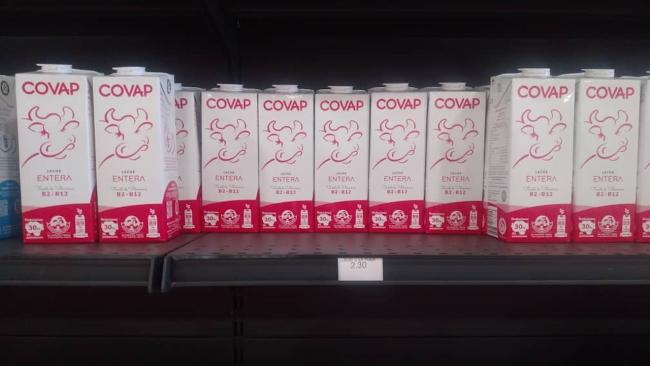"Milk! One kilo, 2,000 pesos; five days of milk for 1,000 pesos!" shout two women in a Santiago de Cuba neighborhood. Both are single mothers and sell the milk designated for their children through the ration book in order to meet other needs. "I need to buy chicken, I have no protein to give my child," one of them replies to a passerby who inquires. Such sales of milk are common among poor mothers, who do so in order to meet other needs.
In mid-July milk arrived at the city's bodegas for children from 0 to 3 years old. They were covering the first ten days of the month with skim milk, which in Cuba is called "for diabetics." Through the rationing system, the Government sells two types of milk: powdered and fluid, the latter mainly in milk-producing provinces and rural areas.
According to the Spanish Pediatric society: "milk, in addition to a balanced contribution of the three main nutrients - protein, fat and carbohydrates - provides calcium and some vitamins. (...) Calcium is one of the essential components of bones and teeth. The stage of greatest skeletal formation occurs in the early years, and at puberty, so calcium is important during these periods."
Ever since the Communist government came to power, milk has been rationed in Cuba. Before losing the subsidies of the socialist camp, in the early 90s, it was earmarked for children up to 13 years old. Today it designated for children up to six years old, pregnant women, and sick people.
In March of 2024 the Cuban Government "requested assistance from the World Food Program (WFP) to purchase powdered milk in order to guarantee a supply for Cuban children," the official press reported.
After this request for assistance from the WFP, milk distribution has been delayed. When shipments are short, infants are prioritized and the rest of the child population must wait for the rest of the milk to arrive. Milk for pregnant women and the sick suffers the greatest delays. According to one pregnant woman: "it can take two or three months, with us there is no hurry."
Milk for the sick, although guaranteed, in theory, is not arriving. This is confirmed by Yunilka, who takes care of her 86-year-old diabetic father. "We just renewed his diet at the doctor's office, but it hasn't arrived for more than nine months. If you ask at the bodega, they have no information, and Consumer Registration Office (OFICODA) tells you nothing neither. I hope that when the situation in the country is solved, they will give him his milk... well, if he is alive, because we don't know when this situation will end."
The scarcity of milk issued limits its purchase.
"Milk arrives when it arrives," says Katia, a grandmother of a five-month-old baby. "I told my daughter not to wean the child, but she did. Now we're running around all the time borrowing milk, or buying it when we can. With the delays in the sale of government milk, it's not enough. Right now, we save up to buy half a kilo from an MSME under the table, because with the price caps it's not often listed, and the kilo can cost up to 2,500."
On July 8 the Ministry of Finance and Prices published in the Official Gazette the price cap on six products sold by MSMEs: chicken, vegetable oils, pasta, sausages, powdered detergent, and milk, whose price was set at 1,675 pesos per kilogram.
The disappearance of milk from MSMEs worries many mothers. On a tour of five MSMEs in the city of Santiago, none advertised having milk. When employees were asked why, they explained that "it’s not worth it, selling it at the prices imposed by the Government."
The other option to buy milk is state-owned stores in "freely convertible currency" (MLC). At these, whole milk is being offered for 2.30, semi-skimmed for 2.25, and powdered for 8MLC per kilo. At the exchange rate of 280 pesos x 1MLC on the informal market, its purchase is unfeasible for the average person.
"No one can afford that milk, it's a luxury," says Alina, 59, who has four grandchildren at home, between five and 12 years old, who are on vacation. The milk at the MLC stores "is more expensive than at the MSMEs. Powdered milk is selling for more than 2,000 pesos. In this case the price is not capped because the store belongs to the Government. Only the rich can afford to buy it," she says.
Cuban Prime Minister Manuel Marrero complained in the National Assembly about criticism of the prices at state "currency collection" stores, which are often higher than those at MSMEs. He said that the comparison is "unfair, because these stores do not buy on the same markets that MSMEs do. They have to buy from more distant markets, at more expensive prices," he argued, recognizing the inefficiency of state-owned stores, protected by the Government vs private management.
According to the WFP, "Pre-pandemic data from Cuba's National Institute of Hygiene, Epidemiology and Microbiology showed a high prevalence of anemia in children aged six to 23 months in the eastern, central and Havana provinces.
For many mothers and grandmothers like Alina, feeding her grandchildren this summer is a constant source of stress. "Of the four, they only give milk to the youngest, who is five years old, but I give everyone milk at breakfast. With the instability of the milk supply, one has to get creative with breakfasts. I'm buying a watered-down syrup to make them soft drinks, and bread with whatever I can get. Food is expensive. My grandchildren are very skinny, they don't eat well. This has become a culture of rice with minced chicken. They don't eat eggs, or beans, or meat, or fish, and you can't buy them an ice cream... Child malnutrition is a serious problem in Cuba."

